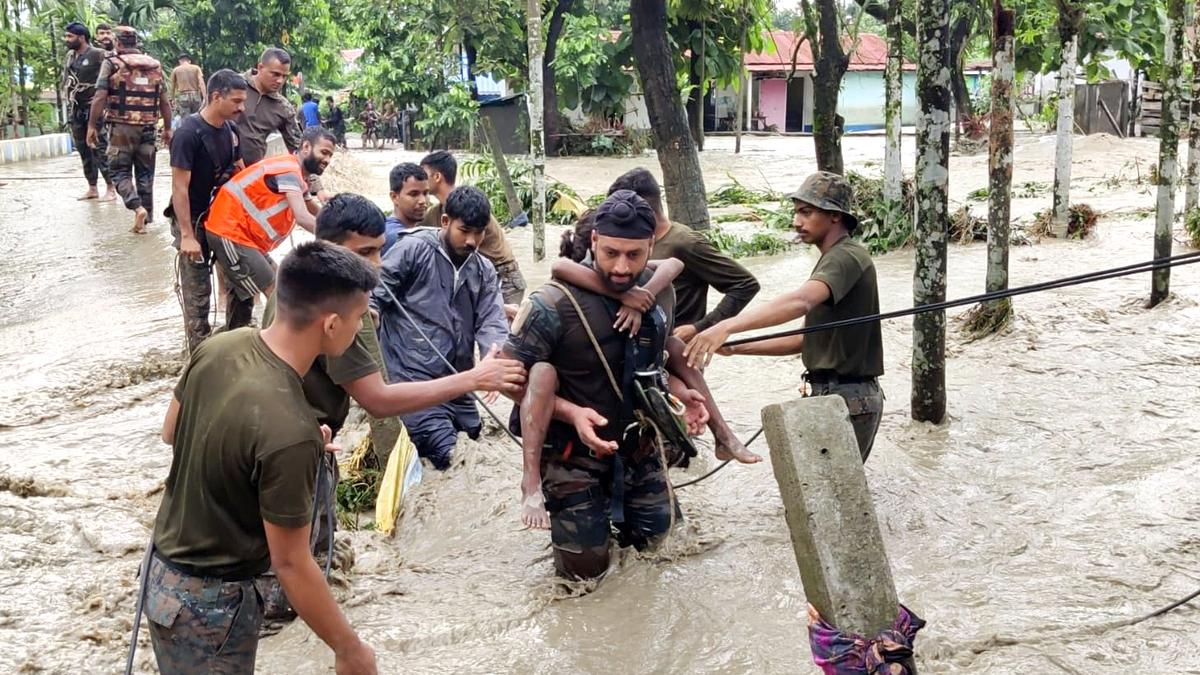
Mamata sends high-level team to review flooding in north Bengal
The Hindu
On July 13, about 72 villagers, including 24 children, were evacuated to safety and were provided basic first aid by the Trishakti Corps of the Indian Army.
With a flood-like situation in certain parts of north Bengal, West Bengal Chief Minister Mamata Banerjee on Sunday said that she was sending a high-level team to the region.
The CM tweeted: “Sending a high- level disaster management team tomorrow to flood- hit North Bengal under my Irrigation Minister [Partha Bhowmick] and including Secretaries of Disaster Management, Irrigation and Agriculture. North Bengal districts have received heavy rainfall, rivers have swollen, roads have been disrupted, properties have been damaged, people have been marooned.”
On July 13, Jalpaiguri district received heavy rainfall of about 132 mm, the highest in this season. Several rivers, including the Teesta, Torsa and Kaljani, have swelled, and water has entered parts of the Jalpaiguri municipality, leaving several areas water-logged. Several areas of Alipurduar district are also waterlogged.
“DMs [District Magistrates] and SPs [Superintendents of Police] are doing relief and rescue works on war footing with help of NDRF and SDRF. I have been monitoring personally and instructed my CS [Chief Secretary H.K. Dwivedi] to supervise the field situation round the clock. No stone will be left unturned,” Ms. Banerjee said on social media.
On July 13, about 72 villagers, including 24 children, were evacuated to safety and were provided basic first aid by the Trishakti Corps of the Indian Army.
“Responding promptly to requisition by civil administration, troops of #KripanDivision #TrishaktiCorps came to rescue of inhabitants of Mechpara village near Hashimara, where villagers were stranded inside village due to floods,” a tweet from Trishakti Corps said.
The Regional Meteorological Centre has predicted rainfall in almost all districts of north Bengal on Sunday, and in most of the districts on Monday.

“Writing, in general, is a very solitary process,” says Yauvanika Chopra, Associate Director at The New India Foundation (NIF), which, earlier this year, announced the 12th edition of its NIF Book Fellowships for research and scholarship about Indian history after Independence. While authors, in general, are built for it, it can still get very lonely, says Chopra, pointing out that the fellowship’s community support is as valuable as the monetary benefits it offers. “There is a solid community of NIF fellows, trustees, language experts, jury members, all of whom are incredibly competent,” she says. “They really help make authors feel supported from manuscript to publication, so you never feel like you’re struggling through isolation.”

Several principals of government and private schools in Delhi on Tuesday said the Directorate of Education (DoE) circular from a day earlier, directing schools to conduct classes in ‘hybrid’ mode, had caused confusion regarding day-to-day operations as they did not know how many students would return to school from Wednesday and how would teachers instruct in two modes — online and in person — at once. The DoE circular on Monday had also stated that the option to “exercise online mode of education, wherever available, shall vest with the students and their guardians”. Several schoolteachers also expressed confusion regarding the DoE order. A government schoolteacher said he was unsure of how to cope with the resumption of physical classes, given that the order directing government offices to ensure that 50% of the employees work from home is still in place. On Monday, the Commission for Air Quality Management in the National Capital Region and Adjoining Areas (CAQM) had, on the orders of the Supreme Court, directed schools in Delhi-NCR to shift classes to the hybrid mode, following which the DoE had issued the circular. The court had urged the Centre’s pollution watchdog to consider restarting physical classes due to many students missing out on the mid-day meals and lacking the necessary means to attend classes online. The CAQM had, on November 20, asked schools in Delhi-NCR to shift to the online mode of teaching.









